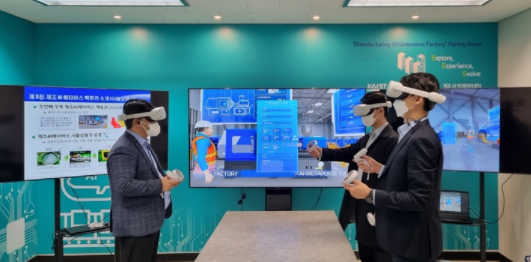Analyzing the Effects of AI Education Program based on AI Tools
AI
Views. 1904
Abstract
Purpose: In recent years, AI technology has emerged as a core technology for the fourth industrial revolution. Along with the existing SW education, it is time to prepare for AI education, since the interest in AI education is also growing. The fact that learning about the theory and principles of AI is important is also stressed in the college education. However, non-major students tend to perceive AI technology to be difficult, and hence, a more efficient AI education is required. The purpose of this research is to guide the learners' direction for AI education, helping them to break away from their fears of AI through the AI education appropriate for the learners’ level.Method: In this study, to analyze the effect of the developed educational program on the learners’ AI literacy, the dependent variables changed before and after the application of the program were analyzed, and the single group’s ex ante and ex post testings were applied for the designing method for inferring the causal relationship.
Results: The AI literacy of undergraduate students was analyzed for the educational program via the ex ante and ex posts testings of a single group by operating this program. As a result of the analysis, significant results were obtained where all three areas of the AI literacy were improved through the educational program
Conclusion: This study is meaningful in that the AI educational program was proposed for the liberal arts class at college for the non-majors, and that the AI educational program which is generally applicable for the liberal arts class was developed and directly applied to validate its effectiveness. Discussions are expected to continue to develop the various details of the AI basic education to ensure that the non-majors can enter the AI education without fearing the AI based on the results of this study.
[Keywords] Artificial Intelligence, AI Education, Education Model, AI Literacy, Artificial Intelligence Ethics
References
[1] Park H. Trend Analysis of Korea Papers in the Fields of Artificial Intelligence, Machine Learning and Deep Learning. Korea Information Electronic Communication Technology, 13(4), 283-292 (2020).
[2] Han J. Changes in Attitudes and Efficacy of AI Learners according to the Level of Programming Skill and Project Interest in AI Project. Journal of the Korean Association of Information Education, 24(4), 391-400 (2020).
[3] Kim Y & Park G. Rubrics and Schoolwide Approach to the Character Education and Some Implica-tions to AI-based Character Education. Robotics & AI Ethics, 5(2), 19-26 (2020). [Article]
[4] Oh K & Kim H. An Analysis of the Influence Big data Analysis-based AI Education on Affective Atti-tude towards Artificial Intelligence. Journal of the Korean Association of Information Education, 24(5), 463-471 (2020).
[6] Jun S. Development of Artificial Intelligence Education Program based on Experiential Learning for Liberal Art Education. The Journal of Korean Association of Computer Education, 24(2), 63-73 (2021).
[7] Yi Y & Park Y. Establishing a Definition of AI Literacy and Designing a Liberal Arts Education Program. The Journal of Language & Literature, 85, 451-474 (2021).
[9] Kim S & Kim S & Lee M & Kim H. Review on Artificial Intelligence Education for K-12 Students and Teachers. The Journal of Korean Association of Computer Education, 23(4), 1-11 (2020).
[10] Wong G & Ma X & Dillenbourg P & Huan J. Broadening Artificial Intelligence Education in K-12: Where to Start?. ACM Inroads, 11(1), 20-29 (2020).
[11] Lee S. Analyzing the Effects of Artificial Intelligence (AI) Education Program based on Design Thinking Process. The Journal of Korean Association of Computer Education, 23(4), 49-59 (2020).
[12] Kim K & Park Y. A Development and Application of the Teaching and Learning Model of Artificial Intelligence Education for Elementary Students. Journal of the Korean Association of Information Education, 21(1), 137-147 (2017).
[13] Lee Y. An Analysis of the Influence of Block-type Programming Language-based Artificial Intelli-gence Education on the Learner's Attitude in Artificial Intelligence. Journal of the Korean Association of Information Education, 23(2), 189-196 (2019).
[14] Woo H & Lee H & Kim J & Lee W. Analysis of Artificial Intelligence Curriculum of SW Universities. The Journal of Korean Association of Computer Education, 23(2), 13-20 (2020).
[15] Choi J. Instructor Competency for Innovative Teaching Methods in the Untact Era. Robotics & AI Ethics, 5(2), 50-56 (2020). [Article]
[17] Lee C. Direction of Software Education in Practical Arts for Cultivating Competencies in the AI Era. The Journal of Korean Practical Arts Education, 26(2), 41-64 (2020).
[18] Yi Li & Park G. AI Ethics and Privacy Right. Robotics & AI Ethics, 5(2), 27-33 (2020). [Article]
[19] Kim T & Park G. Future Oriented Smart Society and Ethical Issues. Robotics & AI Ethics, 6(1), 35-44 (2021). [Article]
[20] Kim T & Park G & Seo E. IR4.0 and Ethical Tasks of AI. Robotics & AI Ethics, 4(2), 6-13 (2019). [Article]
[8] Vazhayil A & Shetty R & Bhavani R & Akshay N. Focusing on Teacher Education to Introduce AI in Schools: Perspectives and Illustrative Findings. 2019 IEEE 10th International Conference on Tech-nology for Education (2019).
[16] Long D & Magerko B. What is AI Literacy? Compentencies and Design Considerations. 2020 CHI Conference on Human Factors in Computing Systems (2020).
[5] https://www.korea.kr/ (2019).
[21] https://machinelearningforkids.co.uk/ (2021).
[22] https://teachablemachine.withgoogle.com/ (2021).
[23] http://cognimates.me/ (2021).

? Source: newsis.com
